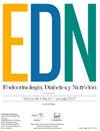Clinical characteristics and management of type 2 diabetes in primary care in Spain. SED2 Study
IF 1.8
4区 医学
Q4 ENDOCRINOLOGY & METABOLISM
引用次数: 0
Abstract
Introduction
Type 2 diabetes mellitus (DM2) is a prevalent chronic disease with major complications. Primary care (PC) plays a crucial role in the management of this disease.
Objectives
To evaluate the organization and resources available in PC for the care of patients with DM2 in Spain.
Material and methods
Descriptive, cross-sectional, observational study in 65 health centers (HC) selected by opportunistic sampling. Data were collected through a structured survey.
Results
Half of the HCs have a diabetes referent, two thirds have specific protocols and almost 90% involve nurses in diabetes education. Access to non-mydriatic retinography is limited (38.5%) and its interpretation varies. Diabetic foot examination is mainly performed by nurses (47.7%) and there is the possibility of referral to vascular surgery or specialized units in most cases. The most frequent analytical tests are the HbA1c every 6 mo (67.7%). 63.1% of the HCs can perform telematic consultations to hospital specialists and most of them have access to patients’ medical records at the hospital. Significant variations are observed in some aspects between autonomous communities.
Conclusions
Care for patients with DM2 in PC in Spain is uneven and presents opportunities for improvement. Comprehensive diabetes care in PC needs to be strengthened, including the training of professionals, the implementation of protocols and the provision of adequate resources. Measures are needed to reduce variations in care between autonomous communities.
西班牙初级保健中2型糖尿病的临床特点和管理中国研究。
2型糖尿病(DM2)是一种常见的慢性疾病。初级保健(PC)在该病的管理中起着至关重要的作用。目的:评价西班牙PC护理DM2患者的组织和资源。材料和方法:描述性、横断面、观察性研究,在65个卫生中心(HC)通过机会抽样选择。数据是通过结构化调查收集的。结果:一半的保健中心有糖尿病患者,三分之二有具体的方案,近90%的保健中心有护士参与糖尿病教育。非散束视网膜造影的机会有限(38.5%),其解释各不相同。糖尿病足检查主要由护士进行(47.7%),大多数病例有转诊到血管外科或专科的可能性。最常见的分析检测是每6个月检测一次HbA1c(67.7%)。63.1%的健康中心可以向医院专家进行远程咨询,其中大多数可以访问医院的患者医疗记录。各自治区之间在某些方面存在显著差异。结论:西班牙PC患者对DM2的护理参差不齐,存在改善的机会。需要加强PC的全面糖尿病护理,包括专业人员的培训、方案的实施和提供充足的资源。需要采取措施减少各自治区之间在护理方面的差异。
本文章由计算机程序翻译,如有差异,请以英文原文为准。
求助全文
约1分钟内获得全文
求助全文
来源期刊

Endocrinologia Diabetes Y Nutricion
Multiple-
CiteScore
2.10
自引率
10.50%
发文量
99
期刊介绍:
Endocrinología, Diabetes y Nutrición is the official journal of the Spanish Society of Endocrinology and Nutrition (Sociedad Española de Endocrinología y Nutrición, SEEN) and the Spanish Society of Diabetes (Sociedad Española de Diabetes, SED), and was founded in 1954.
The aim of the journal is to improve knowledge and be a useful tool in practice for clinical and laboratory specialists, trainee physicians, researchers, and nurses interested in endocrinology, diabetes, nutrition and related disciplines.
It is an international journal published in Spanish (print and online) and English (online), covering different fields of endocrinology and metabolism, including diabetes, obesity, and nutrition disorders, as well as the most relevant research produced mainly in Spanish language territories.
The quality of the contents is ensured by a prestigious national and international board, and by a selected panel of specialists involved in a rigorous peer review. The result is that only manuscripts containing high quality research and with utmost interest for clinicians and professionals related in the field are published.
The Journal publishes Original clinical and research articles, Reviews, Special articles, Clinical Guidelines, Position Statements from both societies and Letters to the editor.
Endocrinología, Diabetes y Nutrición can be found at Science Citation Index Expanded, Medline/PubMed and SCOPUS.
 求助内容:
求助内容: 应助结果提醒方式:
应助结果提醒方式:


